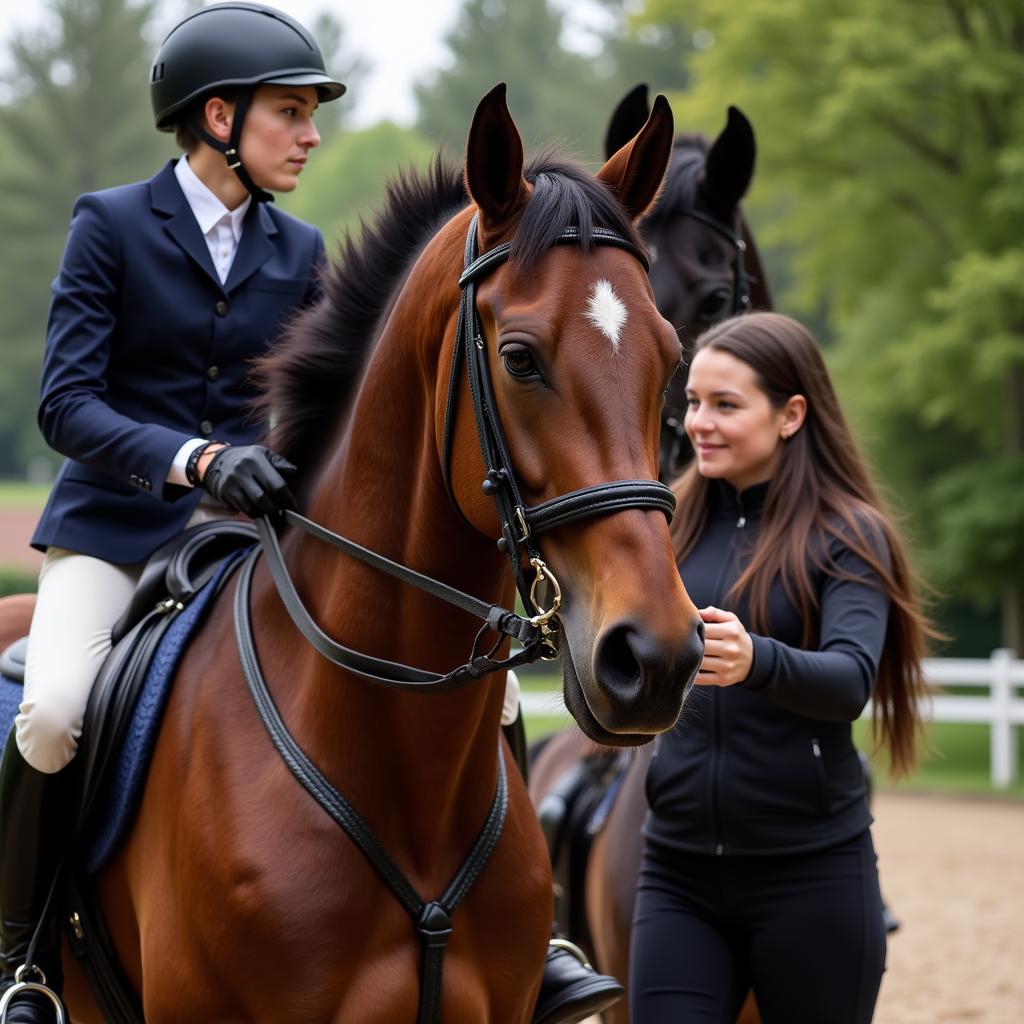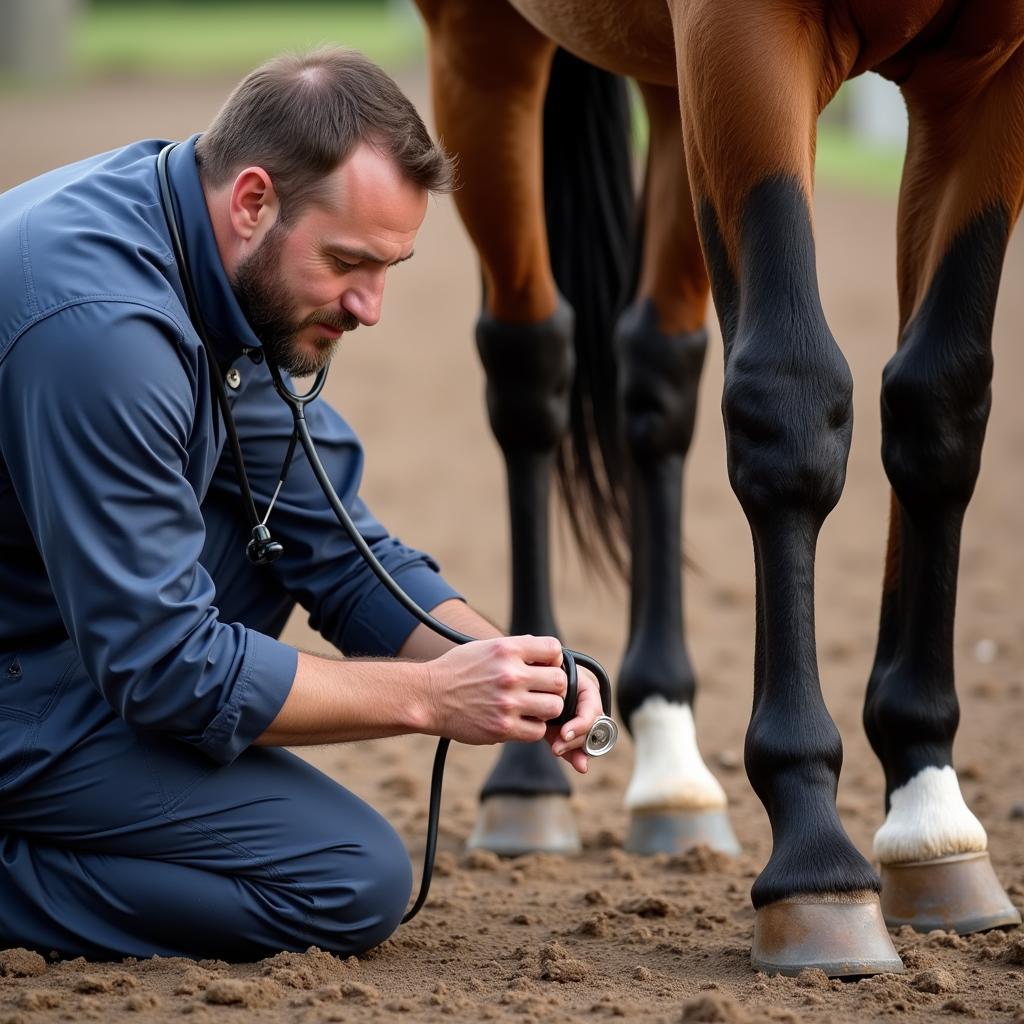Trained Horses represent the culmination of countless hours of dedication, expertise, and a deep bond between horse and trainer. Whether you’re an experienced equestrian seeking a seasoned competitor or a novice rider searching for a reliable companion, understanding the nuances of trained horses is essential for a rewarding partnership.
This comprehensive guide delves into the world of trained horses, equipping you with the knowledge to make informed decisions and find the perfect equine partner to match your aspirations and riding style.
Decoding “Trained”: What Does it Really Mean?
The term “trained” in the equine world can be subjective, varying widely depending on the horse’s discipline, age, and intended use. A “trained” horse for a seasoned reining competitor will possess a vastly different skillset than a horse deemed “trained” for leisurely trail riding.
Generally, a trained horse refers to an animal that has mastered basic cues and commands, including:
- Haltering and Leading: Responding calmly to pressure on a halter and walking politely beside the handler.
- Tying Safely: Standing quietly and securely when tied to a sturdy object.
- Lunging: Moving in controlled circles at different gaits in response to voice and body language cues.
- Accepting a Rider: Standing still for mounting and remaining calm and responsive under saddle.
- Basic Gaits: Moving forward willingly at a walk, trot, and canter/lope, maintaining a steady rhythm and balance.
- Steering: Responding to rein aids for turning and changing direction.
- Stopping and Backing: Halting smoothly on command and backing up in a straight line.
 Trained Horse and Rider
Trained Horse and Rider
Beyond these foundational skills, further training depends on the horse’s intended discipline. For instance, a dressage horse will receive specialized training in advanced movements like lateral work and collection, while a jumping horse will be schooled over fences of increasing heights.
Evaluating Trained Horses: Key Factors to Consider
When selecting a trained horse, it’s crucial to go beyond the label and thoroughly assess its suitability. Consider these vital factors:
1. Discipline and Riding Style:
Different breeds and training methods cater to specific disciplines. Determine your preferred riding style and choose a horse with experience in that area.
2. Age and Experience:
A horse’s age and training history influence its temperament and capabilities. Younger horses may require more experienced riders, while older horses might have established habits and preferences.
3. Temperament and Suitability:
Observe the horse’s demeanor both on the ground and under saddle. Look for a calm, responsive, and willing attitude. The horse’s temperament should complement your personality and riding abilities.
4. Health and Soundness:
A pre-purchase veterinary examination is paramount. A qualified equine veterinarian can identify potential health concerns and assess the horse’s overall soundness, ensuring a wise investment.
 Veterinarian Examining a Horse
Veterinarian Examining a Horse
Navigating the Search for Your Trained Equine Partner
Locating your ideal trained horse requires careful consideration and research. Utilize these avenues:
- Reputable Breeders and Trainers: Seek recommendations from trusted sources within the equine community.
- Online Equine Marketplaces: Explore reputable websites specializing in horse sales, filtering by discipline, breed, and location.
- Horse Shows and Events: Attending events allows you to observe horses in action and connect with knowledgeable individuals.
Remember to inquire about the horse’s training history, including previous owners and trainers. Requesting a trial period allows you to assess compatibility and ensure the horse aligns with your expectations.
The Journey Continues: Ongoing Training and Partnership
Acquiring a trained horse is not the finish line but the beginning of an incredible journey. Consistent training, proper care, and a deep understanding of your horse’s needs are essential for a thriving partnership.
Investing in ongoing training with a qualified professional helps refine skills, address any behavioral issues, and strengthen the bond between you and your equine companion. Remember, a true partnership is built on trust, respect, and a shared love for the equestrian world.
Frequently Asked Questions about Trained Horses:
Q: How much does a trained horse cost?
A: Prices vary significantly based on breed, age, training level, and location. Be prepared to invest in quality, as a well-trained horse is an invaluable partner.
Q: Can I train a horse myself?
A: While possible, training horses requires experience, knowledge, and patience. Seeking guidance from a professional trainer is highly recommended, especially for novice equestrians.
Q: How do I know if a horse is trained for my discipline?
A: Ask for detailed information about the horse’s training history, including previous disciplines and competition records, if applicable.
Looking for horses for sale? Check out our selection of Overo Paint horses for sale. We also have a variety of untrained horses for sale if you’re interested in starting a horse from scratch. No matter your experience level, we can help you find the perfect equine partner. Contact us today!